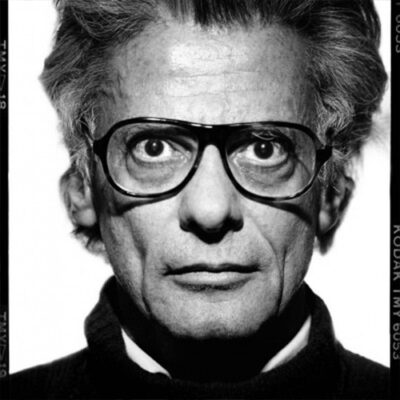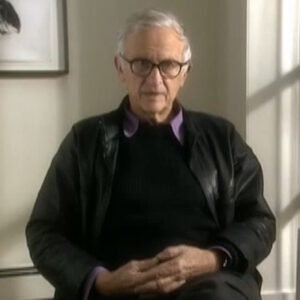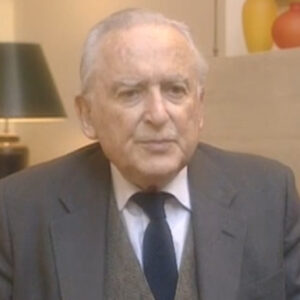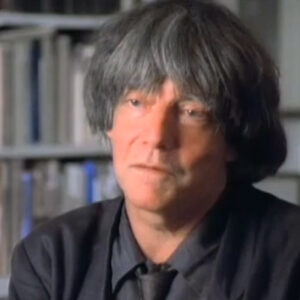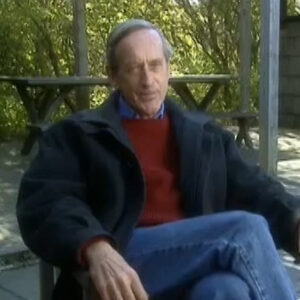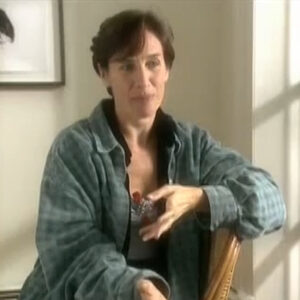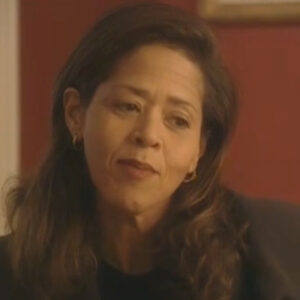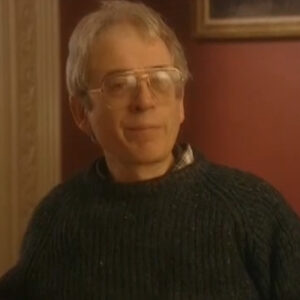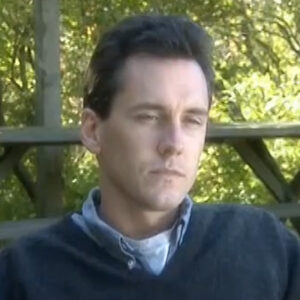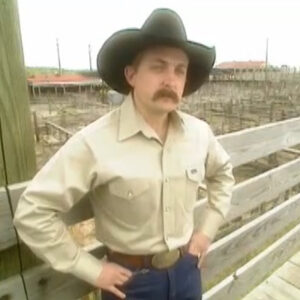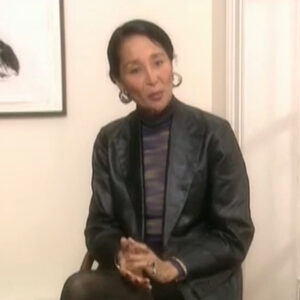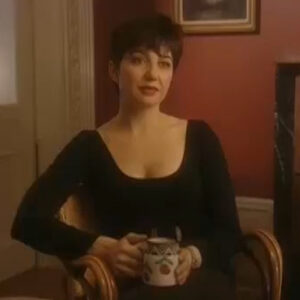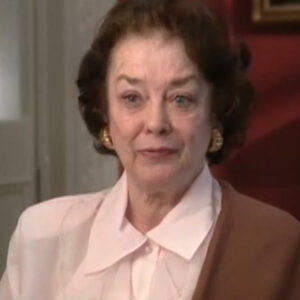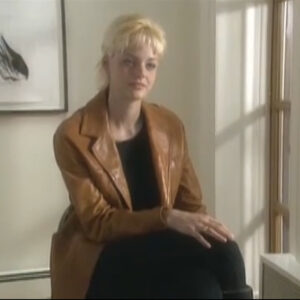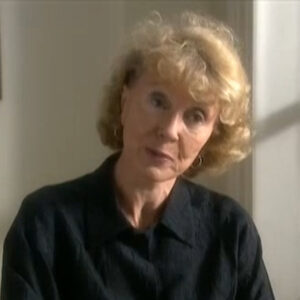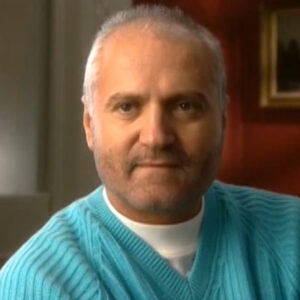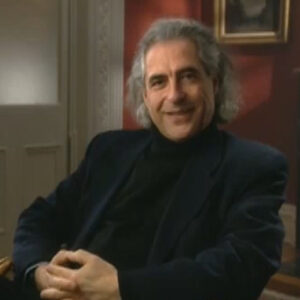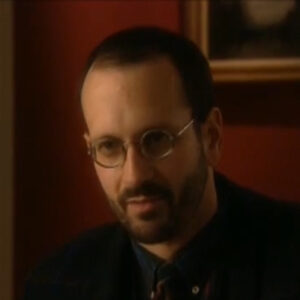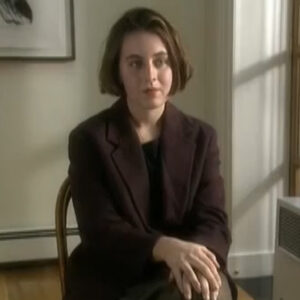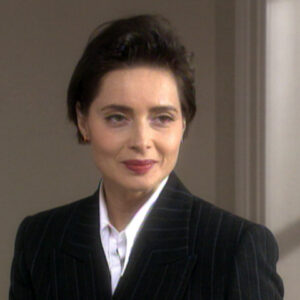Speaker He’s an enthusiast. It’s not in any sense artificial. He was born that way, is sustained that that quality throughout his entire life. He delights in the world. And I think that the pleasure that he gets in the investigation of every new adventure is infectious. So it has a self dramatizing quality about it, but it also has a tremendously energizing quality about it. And it’s very much integral to his work. But it’s genuine. It’s in no way artificial.
Speaker And, you know, it amazes me, having seen him my whole life, that he can still be as enthusiastic as he is about the world. I mean, of course, the world is an infinitely fascinating place.
Speaker But for some reason, he has never lost his romance with the fascination. And that is not to say that he hasn’t suffered and hasn’t found, you know, certain hopes cast down, but he has that tremendous, tremendous optimism and enthusiasm.
Speaker You’re alluding to we also have some, you know, these narration songs, something about their quality.
Speaker You want me to Salmonsen.
Speaker So I have to say.
Speaker I see. I see. Okay.
Speaker That you’re single minded. Quality of your father’s expresses itself in his work, told his story.
Speaker Talk what the token story is illustrative of the single mindedness of purpose and the refusal to take no for an answer. And it’s also illustrative of the the, you know, inimical mixture of wonderful and unpleasing qualities.
Speaker When I was about twelve, I was absolutely obsessed with talking. Most people my age were. He had just come out here just before he became tremendously famous. And, you know, I was living in those books and my dad knew it. And as a treat, a gift to me, because, you know, about my love for Tolkien’s writing, he wrote Tolkien and asked if I could meet him because we were going to be over in Europe every summer. My father did the collections in Paris. And once in a while, I would join them on vacation afterwards. So at this point, I was going to join them and Tolkien’s wife wrote back and said, I’m so sorry. But Ronald was very sick at this time and he can’t be receiving any visitors. So we were in Switzerland and my father purchased a cake. He had discovered the date of Tolkien’s birthday and he purchased a birthday cake. And we flew from Switzerland to London with the birthday cake.
Speaker I don’t think I knew what was going on quite yet. We went in a car down to Oxford, and as we pulled up in front of Tolkien’s house, I realised or on the journey down realized that we were actually going to barge in on my God and uninvited.
Speaker And in fact, I’d gotten the whole story out of dad at that point, not wanted. And I was mortified. I mean, anybody would be.
Speaker And he very briskly and bravely and completely, you know, without the slightest sense of inhibition or shame, went right up and rang the doorbell and said, hello, I’m Dick Avedon. I’ve written to you.
Speaker I know your husband’s not feeling well because Mrs Token that answered the door. She’s an incredibly sweet. She was just like a hobbit. Incredibly sweet to me. Incredibly sweet at that time, old lady with a very warm smile and instantly got.
Speaker And here’s a birthday cake for him because it was his birthday or that they’re the next day and we’re so sorry he’s sick. But I’ve just come with my son who would die.
Speaker And of course, being impeccably polite, they invited us in and he wasn’t sick at all. He came down the stairs. She said, wait, please wait a moment. Let me go inform him.
Speaker And he came down the stairs with an aerosol can, spraying the air in front of him to pretend that he didn’t want to infect us.
Speaker And within three minutes, we were upstairs in his study and he talked to me and my father said, here’s my son. He wants to be a writer.
Speaker And Tolkien launched into a 45 minute description of what it is to be a writer and what’s necessary. And it really did have a very important effect in my life.
Speaker After the experience, my father made me write it down in a journal which was promptly lost properly, but that naturally, as it would for anybody, sticks in the mind as the kind of story that’s very much his quality. It was a wonderful experience. I feel sorry for the. That they had to be subjected to this. But we were the first wave after the US had gotten much worse.
Speaker When he really became famous, I’m sure that his life was paved tortures, you know, hordes of people like us. But for me, it was a wonderful experience, even though so fraught. And my father would not take no for an answer, clearly.
Speaker And the use of charm and the birthday cake, which was a highly transparent device, seemed not to embarrass him in the least as long as he had had his excuse. That was good enough for him. So.
Speaker You know, I’m indebted to him, to the experience. I never would have met talking without that.
Speaker And it’s certainly impressive for us now.
Speaker Yes, absolutely. I mean, there’s another quality in him which is important to his work, too, and I think many people will relate this about him. He’s a quick study and he senses on a gut level. What inspires or interest people or what they’re most enthusiastic about. And even though he might not understand it, he he recognizes that there’s where it is and he feeds it and he draws them out. And it’s not simply to apprehended and and make it his own. It’s to enjoy it himself and to make the best of them come forward. So he certainly has a son or, you know, he would not be hard for him to know about me, but he does that with everybody.
Speaker And I’ve seen him do it in his professional life. He will draw out the spider because he’s interested. And then an actual experience occurs and that has to be integral to his creative process.
Speaker This very human dynamic, he’s accused so frequently of being, you know, on virtually solipsistic in his imposition of his view of of the SIDOR, that he is simply utilizing them almost as if they were clay to a projector, you know, impute his own message onto.
Speaker And that’s actually not the case.
Speaker But it’s a very ambiguous ratio of the two, how much he’s imposing, how much they’re giving. And he’s a very theatrical personality. So he manages to create this dynamic through which he works. So it’s all, as you point out, very much related to his personality structure.
Speaker If you just that that so often says that this this heightens this ambiguity. The work is a fiction. The basis of fiction is that I created and I’m writing a biography.
Speaker I don’t buy that. But, you know, that’s I mean, that’s a little megalo maniacal.
Speaker I’ve I think put probably necessary because the creative act requires a vision and he has the vision.
Speaker So, I mean, I can understand why you would feel that way. He probably doesn’t really believe it, but it’s necessary to have a vision. And he does very often.
Speaker Just finish that, cut back that quickly, quali fierce Singhalese, I would imagine, and I’ve heard that again, the air quality would go. It was work that there were people that he’s wanted to me for his photographs that he will not take no for an answer to.
Speaker And you will find that he will track them down. He will arrive. He will write them.
Speaker Is part of that what you’re talking about in that talk and story, I imagine has served him quite well.
Speaker Yes, I mean, he’s omnivorous. But in the best sense of being omnivorous, he’s not interested in social status. He’s not interested in self aggrandizement. He enjoys those perks, so to speak, of success. And he’s been attacked ruthlessly because he makes no secret of the fact that he likes to be successful.
Speaker And that’s an important part of his enjoyment of life is succeeding and his pleasure. And he admits that. And he’s a to what?
Speaker You know, some people might think to a shameless extent, but in fact, what’s really driving it, in my personal view, is this deeper, far more profound, genuine interest in the people he’s seeking out. And in the stories they have to tell and in the life experience they have. I mean, he’s interested. He’s omnivorous in the sense that the world fascinates him. I mean, it is a genuinely you know, it is a cornucopia. And in that sense, he is quite literary. He he sees stories wherever he goes and he creates them when they’re not there. He will create an anecdote out of something that actually doesn’t have the story in it. But he will extract a story from it. So he’s a great myth maker in that way.
Speaker And that’s also a central part of most creative people.
Speaker But I think people misinterpret him frequently because what they see is the kind of exultant glee or the pleasure in the success and wanting to put himself across. And what they miss is the fact that he’s getting something much deeper out of this.
Speaker And there is an actual creative, you know, quest going on in this man. And it’s been going on his whole life. It’s not simply.
Speaker You know, a a materialistic drive for success and wealth. That happens to picked on photography as the means of accomplishing its aims. That is not it. But the reason people can’t stand that aspect of it is because they’re very used to having the artist suffering and the businessman succeeding. And he mixes those two roles in a very antagonizing way. For some people.
Speaker It’s also very, very. How does celebrity eight year old daughter struggle with.
Speaker Most people who look accomplished a great people, that little boy listening to rock monologue for barging in on Salvador Dali, which is an amazing story as well. You see that from traveling, too?
Speaker Yeah, that’s what always amazes me, that he’s actually that interested. I mean, I don’t think I think that underneath the surface, we’re gonna find the same story everywhere. Everybody’s suffering. Everybody’s got their problems.
Speaker And no matter how bright and glistening the veneer is, the sadness is there underneath. And it’s so it’s actually not as attractive as it looks. But he continues to be immensely inspired by the belief that it’s all quite beautiful. You know, he’s a complicated person. Everybody’s complicated. He sees the tragedy in a lot of his work is reflected that. But he’s never lost in the face of the suffering, the exuberance for the pleasures. It’s not damaged. It it seems invulnerable. He will barge in because he thinks it’s great fun to be had.
Speaker He certainly has deconstructed, though, usually the cliches about celebrity looking some dark faces with all that, Joie, that you talk about in optimism.
Speaker There’s also that because he is so complex, that other view of what lies beneath the surface. It’s very dark and afraid of faces.
Speaker Now.
Speaker I have no great formula for understanding his his, you know, unique mix of of.
Speaker Recognizing the nature of suffering and everything and enjoying the great pleasures that life has to offer at the same time, I don’t understand how he combines these two qualities. I can speculate, but I don’t know if it’s accurate. I think he just runs with high energy because he’s gotten manic qualities in his personality.
Speaker So when the depressing stuff gets bad, he keeps pushing on and he won’t want to drag him down. And that’s an incredibly valuable quality to have in life. It makes you survive. It makes you know, we all are confronted by one obstacle after another. And if you have that quality, you have the optimism to keep going through whatever hits you. And the greatest source of success is that I mean, that’s a big cliche, but it’s true. If you lose hope because it’s just too tough, you don’t keep going. But he never loses hope. He just keeps going. I really admire that. I really do.
Speaker His obsessions are generally absolutely delightful. One thing that struck me when I was growing up was the screening of, I guess, Sagi.
Speaker Ben, I’m not gonna pronounce his name correctly. Bunder a child. I think the Russian filmmaker who made 16 hour war and peace in about 1966, 67, and we were in Paris and dad had heard about this masterwork. And I think he had heard about a young girl by Natasha in particular. So he rented an entire movie theater.
Speaker This was one for the days of video.
Speaker And myself, one or two friends, my mother and my father sat for the entire day in this movie theater and watched this dazzling and extraordinary film. And it was just, you know, I mean, the film itself was so breathtakingly brilliant. And that’s just the kind of thing he does. He will go again and again to a play that he likes. He will. And he will live inside somebody else’s creative expression and feed on it for, you know, in an obsessive way for a very long period of time. And it’s wonderful. It just energizes him. And he always has something like that going. There’s always some piece of work. Some creative, generally theatrical. He’s very, very involved. Performing arts. I mean, he is a performer himself and he loves the performing arts generally, a play or a dance or something that he’s seen 10, 10 times. He’s watching the rehearsals. He’s going back. He meets everybody in the cast. They get to love him. He gets to love them. Then he works with them. There’s always something like that going on. So it does come from his childhood, obviously, when this first sense that life on the stage or life and the heightened atmosphere of drama is much more exciting.
Speaker And he keeps going with it because you said, you know, we used to have a running fight in my family.
Speaker He used to say, you’re a Jew. And I said, I’m Apsley, not a Jew. And this was a kid.
Speaker And Shirley Bernstine, Lenny sister, who was a very close family friend, would chime in at the table and said, the very fact that you’re denying that you’re a Jew is is proof that you’re a Jew. And I would say whatever, you know, a twelve year old or 11 year old says in response to that.
Speaker But I was adamantly opposed to this role that I was being placed in by these adults until I got older and realized that my father, who has absolutely no religious sentiment of any kind and has no cultural sentiment in terms of Jewish culture, has a very standard Jewish personality, if that’s not too big a generalization to make. And by that, I mean he thrives on anxiety. It’s a way of life.
Speaker And as opposed to the standard view of stress shortening one’s life. I think it actually keeps it’s a form of internal exercise. It’s going at all times and it keeps you young. And in his case, definitely. That’s true. There’s a downside to it.
Speaker But this sort of constant questioning, constant anxiety, constant, never accepting things passively, never accepting situations as safe. Never accepting. What’s given? I mean, it does have a downside, but it also has a a very. A bullion trade in it that that marks him and that’s Jewish. I’ve seen it in a lot of the people that were in his peer group when I was growing up all shared this quality. They were from poor financial backgrounds. They were all self-made, very talented, creative people who fueled by the optimistic you economy in the 50s after the war was over and fueled by their own ambition, made it at very young ages to the top of their professions and fields. And they all socialised together.
Speaker And they had this quality in common of being driven, anxiety ridden, narcissistic, talented, Jewish.
Speaker I mean, I don’t know how else or how better to describe it. So in that sense, he’s Jewish. But he is. No. To my knowledge, feeling for anything beyond that in the Jewish culture at all.
Speaker He’s right. Was so concerned. You’re saying that you weren’t Jurafsky anti-Semitic Sunday. You remember this? No. You bring in people to talk to you about being Jewish.
Speaker No, I don’t.
Speaker He said there’d be a series of pictures that had the most residents for you because you participated in some degree taking visiting his father with a series of pictures, a little bit about the power that they had about your connection going down to your father’s.
Speaker Actually, I was not present during any of the. Sitting’s. Those are very complicated photographs. But there. Profoundly moving and wonder grandpa ever saw them and if he did what he thought about them? I don’t know.
Speaker Anyway, what to say?
Speaker Go, go, no.
Speaker Oh, of course, it wasn’t weird that he was getting to know him again. I mean, they had a complicated relationship. All fathers and sons, all parents and children do.
Speaker But his father, my grandfather was the seventh, I believe, child in a family of Russian Jewish immigrants who came over at the first decade of this century. And he lied his entire life about who he was. And we didn’t find out until after his death that, in fact, he had been born in Russia. First, the story was he was born in America. And the story was 20 years later. Now, in fact, he was born in the hole of the ship coming over. And just before his death. Well, no. He was born in Russia. He was the youngest.
Speaker They hit the docks and the father abandoned the whole family. They didn’t speak a word of English. The mother was left with seven children. They had no money. And we never the family never heard of that father again. He vanished. So Jack Avidan, my father’s father, was sent to an orphanage along with his three of his brothers. And the other four kids stayed with the mother. And the three that grew up in the orphanage stayed there for their entire childhood. I believe the family worked as hard as I could to get enough money to send one of the kids to college. And that was the youngest one, my grandfather. And he was a man who had the typical life of a Russian Jewish immigrant, which was one of tremendous suffering and struggle in this country. And he made his career in the Schmitter business, as they all did, and got onto Fifth Avenue and 44 a street and opened a fashion department store called Avalon’s and lost the whole thing in the Depression, probably literally on Black Friday, not within a week of it.
Speaker And his entire life was only able to express emotion through discussing money and material objects because his life had been such a struggle. And in the time you’re alluding to at the end of his life, when he is retired and living in Florida, there were very poignant moments when he tried to show dad how much you loved him, but he could only do it in terms of discussing the will. Or at one point, I recall, he walked over to an armoire and took out one of his jackets and said, Dick, try this on.
Speaker And my father absolutely flipped out. He said, no, no, no, no, no.
Speaker It’s very upsetting to him because his father wanted him not to lose the expense of a sports jacket after he died.
Speaker And that was his way of showing love for his son. But to my father, for whatever reasons, I don’t understand. It was too painful for him to take. So he refused to try it on.
Speaker He was a survivor and he was a cold man and he had cruelty and and because the world had been cruel to him and.
Speaker The real influence, I think, has been my father’s mother, my grandmother, who was also an extremely strong woman. But as a mother, far more nourishing and supportive, and also had the theatrical interests that have so inspired my father. So the photographs that he took at him in the last stages of cancer as he was attacked by one critic for obviously reflect his anger and bitterness towards his father for the neglect that his father showed him as he was growing up. But I also think that’s too simple. They also show a great deal of tenderness because.
Speaker They reflect the man suffering at the end of his life.
Speaker And to me personally, as a kid, you know, kids don’t respond well to cold adults. People who are not physically warm and don’t hug them. And grandpa was not comfortable physically with people.
Speaker So he would say things to me like don’t say I forgot whatever curse word I was using at that age. He would say, I take God or something. I never say God, say no. That was you know, he was a little judgmental.
Speaker But when I saw the photographs, I was upset by them. Because I felt it was an invasion of privacy and.
Speaker That, of course, is the very essence of being a photographer. It’s an invasive, in many ways art form.
Speaker And there’s a lot of discussion about this point.
Speaker So I’m curious what grandpa thought about them, if he had seen them, but I don’t know, maybe since a few minutes. This is an initial response when we say this was how could you do this to me?
Speaker But then your father wrote a letter.
Speaker You haven’t known me for my life. What do I what I can do? I saved the best for strangers. And this is what I can show you. Mike gives us a photographer. And I want you to know me that way.
Speaker And apparently the letter had a tremendous effect on this author. That’s nice. I think that’s. I think that’s what. That’s for sure. But there was this letter that passed between them about.
Speaker About those pictures. And you’re right, Grandfather’s first response was, I want to be seen as I was in that background is the Barcroft picture of him. That’s what I want.
Speaker And actually, your father talks about this period of which he really wanted to work around that presentation. That wasn’t what he felt was the truth or what was happening. I wasn’t ready to take that. I think he feels that ultimately his father did come to appreciate what he was doing.
Speaker Was there some chance that.
Speaker If there’s some reconciliation that came out of it, that’s nice, that’s nice, but they’re they’re very upsetting photographs. I can’t look at them. I’m very upset whenever I see them.
Speaker The emotional subtext. Yeah. Oh, yeah.
Speaker No, I don’t mean it just because he’s my grandfather. That, of course, is in it, but because, you know, that’s it. You’re seeing the last few stages before you check out.
Speaker And cancer is the play, one of the plagues that we have. Most people are gonna go that way. So. And he shows it to.
Speaker We want to talk about another wonderful quality of your father’s, which is his need to make events or occasions of small events to make to make something, whether it’s a birthday party with or the fortune-telling or the or the wedding, the studio wedding at the movie theater, just bigger and bigger moments that become unforgettable times where sometimes you wanted to get this day when that happened, but then they become absolutely marvelous. And only anecdotes that you have about that, his friends all speak about this. So what’s the director directing your lives as well?
Speaker So now they can have tunnel vision quality, as you mentioned to me, that the magnificent vacation that he offered you at the end of Dolgan.
Speaker You know, I don’t we just. I mean.
Speaker I think it’s what I was saying before, basically, which is that it’s always a very mixed story. He does it so successfully and he pours so much spirit and intelligence and savvy into this dramatisation of life that he creates that it becomes in spite of the invasive and, you know, imposition that it usually begins with because nobody asked.
Speaker It becomes a thrilling experience because it’s done so well.
Speaker And then, as I said earlier, his own enthusiasm and his great concoction is infectious. So that also, if you surrender to the the joy in it becomes tremendously fun. But it is a relentless quality in him that is intricately related to his whole professional life. Absolutely. And it’s totally in his personal life of making events, making stories. You want me to come with a specific anecdote? My father was a typical father of the 50s in many ways, he was very hardworking and so he didn’t spend the kind of time with me that fathers in the 80s and 90s some fathers spend with their kids. So it was very much a man of his generation. But what he did do, because I was an only child and he was a conscientious father, was to take trips. And what we now call quality time, reserve quality time in his very busy life for me. And not every trip we went on together was a great theatrical display. Not at all. We took a bicycling trip around Ireland. He and I together, which was perhaps for me the most beautiful experience of any of these trips. And that was very low key. Just two of us biking together through the mist in the rain and up and down those green hills past the gypsy wagons and staying in in little country inns each night. And I remember we first got off the airplane from London and there were two bicycle’s at the chain link fence surrounding the tarmac, just waiting there for us. How sweet it was. He had, of course, arranged that. So that was it. We just got on the bikes right then and there off the airplane and biked out of the airport.
Speaker And that was just wonderful. And spend a week doing it. And I had a real chance to talk to each other. And he told me about his life for the first time on that trip. His professional life.
Speaker Yes. He’s driving my car, Mel Snow, quite a lot and her eccentricities. And I had no idea. Perhaps this is of interest to you. I don’t know. My father has never been interested and never made any attempt to impart any of his work to me. I know nothing about photography. He never had me into his studio to learn anything about photography. It was something to the extent that I know anything about it, there was just as most or absorbed, you know, totally unconsciously on the periphery of our lives. He never brought the actual work into the home and he never brought me or the home to the work.
Speaker Complete separation.
Speaker So on that trip, hearing about his professional life was quite interesting. I had no idea what he did at all. But then because he loves celebrities and he loves people of genuine accomplishment, not people who have artificial fame, who don’t have any any requalify to back it up with, they were always very exciting things going on. I remember the night Nirav came over to the house. He was going on for days. He jumped to freedom.
Speaker Was the story. Who jumped to freedom? What does that mean?
Speaker Then he’d tell the story again and again about how an array of jumped the customs line as they were taking him back to Moscow and Paris. Apparently maybe had the story wrong, but he he literally did a great ballistic leap to the West and Liberty.
Speaker And this this just had my father completely inspired by the idea of leaping to freedom across, you know, an airport and a border.
Speaker So he would he talked about that four days before in Iraq. And then when this man finally came in the living room and I was peeking around the door to see who this character was. I could tell definitely that my father was very excited. No question about it. I mean, he loved having to arrive in the house.
Speaker For this purpose, mm mm mm mm mm mm.
Speaker No, but he shunned society.
Speaker He’s not interested in society. He’s not interested in.
Speaker In any of the more superficial aspects of celebrity.
Speaker Another thing that you said that is really a great gift to date to.
Speaker Of course, of course, the civil rights movement, they didn’t know much about politics. And it was a genuine passion of his. And he introduced you to it in various ways. We talked about that.
Speaker He has some of those 60s photographs taken out of.
Speaker This is another quality of his time and place as well as character. You said one of the Jewish qualities, but there’s a certain progressive liberal Jewish tradition.
Speaker And he fits into it very much. He’s, you know, actually the product of it in his sensibility.
Speaker He’s a very ethical man, very ethical and and has always felt that his work and that one’s life has to be involved, social causes, that it’s a responsibility that we all bear. And so he’s engaged in this first came to my attention when I was 10 years old and he went down to photograph the Student Nonviolent Coordinating Committee in Atlanta when it was formed Snick, which was maybe 62. And when he came back, he was totally thrilled with these young people who were probably at that point just a little younger than him who were reading this nonviolent movement for civil rights.
Speaker Like a lot of New York Jews.
Speaker And, you know, in other words, his inspiration was in common with a lot of other people’s inspiration about changing this country and breaking down segregation. So in any event, he described what their work was. And and through him, I began writing to I believe it was John Lewis, actually. And I also seem to have the same gene in me. That was the first point that my political words started.
Speaker So in many ways, I that I can point to that as the catalyst for taking pictures.
Speaker You the photographs themselves never struck me that much was just that the stories. I mean, I’m.
Speaker Was there’s Malcolm X is smart enough to know all the wrong things in.
Speaker Yeah, I mean, as a kid, the images didn’t strike me that much. It was simply the quality of the people he was describing and how important the work was. That’s what caught my.
Speaker No, I don’t.
Speaker Can I ask for a quick cup of coffee? Oh, yeah. I mean, is that possible?
Speaker I mean, unless you want to stay world, you do three more minutes and I can keep going.
Speaker Just one page just said essentially that you that you just dropped the ball.
Speaker People just have all those images, just one.
Speaker What’s your favorite color?
Speaker Well, my favorites have a beautiful women here, the ones on my wall.
Speaker These exquisite women in the 1950s and these extraordinary dresses leaping through Paris. And I mean, I’m a soccer vord. Absolute I mean, the real sense of beauty and elegance and of frivolity, joy. It’s just they make me happy to look at them. Those are the ones I look at, the superficial ones. But in terms of content, the ones that move me in the most recent work, the Volpi Ball. Definitely because it really reflects his literary sensibility. He is an essentially affect oriented person. He’s not linear and is thinking he’s not particularly interested in logical explanations. He’s interested in how something feels. And he gets the nuances of character on a gut level with an extraordinary acuity. And it comes out in that photograph that is quintessentially Balzac image. And it’s very gated enough so that the different faces all express something unique to them. But in keeping with the overall theme of the picture, which is, you know, the absolute vacuity of a sybaritic life and the, you know, the dead end of the aristocratic world. So I love that photograph, but that’s because of its literary sensibility.
Speaker And that’s a recent photograph. And it’s a complete fake. It’s all cooked.
Speaker Some of the pictures were blown up. Some were made small. Some were put together. Maybe I’m revealing family secrets. I don’t know. But that doesn’t matter to me in the least because.
Speaker The the overall work is so fully realized and other recent pictures that are very moving to me, this might seem strange, but the last image in the series of New Year’s photographs taken at the Berlin Wall of the Wraith like white. Skull and torso ascending is just one of those pictures that if you spend any time with it stricken, it is stricken, it strikes you, yet it evokes so many contradictory things, both transcend and.
Speaker Sense of release. And, of course, the Holocaust. And so that image captures me a lot. And. I’m at a younger age, I was interested in the Oscar Levant photographs because they are so puzzling and they are so inviting and. Intriguing and manea in this man’s face. And I guess those photographs actually still inspire me tremendously because they embody a lot of what I feel is so brilliant in his work. I don’t even know if he even thinks like this or this is what’s going on in his mind. But he does have the capacity with some of the greater photographs to create an archetypal image out of a highly particularized face in person so he can strike both chords at once. He can capture the individual because it’s a very it’s a photograph. It is an individual. And the individual can fully express archetypal or, again, transcendent point about life and the human condition. And the last call that photographs are so opaque and what’s really going on in his particular mania. But they’re at the same time so exemplify sick of the absurdity and insanity of life on this planet. He’s howling in the face of the void and he’s laughing and screaming at the same time. And the anarchic, you know, crazed quality in that photo, in those three photographs is something, you know, spiritual to me. So I don’t know. My father thinks in those terms at all. But that’s what I get as one of the viewers of the pictures. And there are other images that have those qualities in them that are both particular and, you know, in general comments and sometimes in some of the weaker images that have been attacked.
Speaker Again, I think he I mean, every artist, every person, not just creative people, every person does what they can do.
Speaker Well, when it’s when they’re tired, they do it over and over again just to fall back on because they know that’s what they can do.
Speaker So some of the weaker images fall back on that type of visual apotheosis and they aren’t quite as profound.
Speaker That’s too big a question for me to answer. What is the primal fear in all of us that makes some of us have to control everything we can?
Speaker I mean, I’m.
Speaker It’s a big question, but it’s of course, it’s the driving force. And I think all photographers have that quality. Like I said earlier, this is just my personal view. It’s by nature an invasive art form in many regards. And it’s a very controlling art form. Because you’re actually have to deal with real living people and you have to disregard their sensibilities in order to do what you want to do.
Speaker So I’ve detected that many photographers. He’s very much true to the type. He’s not unique and individual.
Speaker The photographers that I’ve met and I don’t know that men and I’m not close with that many. They all have a very controlling personality. They are demanding. They are manipulative. They want things their way.
Speaker They want everything in the frame. And they feed on people’s narcissism in order to get what they want. So there’s a real symbiosis going on.
Speaker I was brilliant at locations of narcissism on the far side.
Speaker Which one do we stand next to? A man that he knows?
Speaker Oh, yeah, of course. Right now, it’s fantastic. It’s fantastic. Yeah. Yeah.
Speaker Well, I’m just think about this.
Speaker You have three sons and a very hands on father. What, if anything, have you taken from the fathering that you’ve had and the lessons of fathering your sonship with your father, given that your kids. Ways to do so in ways not to give. But how how is the.
Speaker I don’t know. You have to ask my kids, you know, half the question how they feel about their father.
Speaker But I certainly know from my side what has been so valuable in his parenting, me that I’ve tried to copy because I admire it with my own kids. And that is a tremendous sense of commitment and involvement with your children, because your family is, you know, the people in your family or the people you’re most responsible for.
Speaker And it’s the essentially only meaningful thing in the long run because. What you have to do is, is help the people closest to you. And that came from my father. He has that’s what I meant when I said he’s essentially in a very ethical human being. He has a complete sense of the responsibilities of human life and the responsibilities of family life. And that’s what it means when you say a mensch in Yiddish.
Speaker And he has that. He was born with it. Where, you know, I don’t think he got it from his father. I don’t think, you know, grandpa necessarily had it. It’s clear to me that he overcompensated in our relationship for the dearth of affection and emotion that he had with his own father. And in terms of my relationship with my three sons, I think I’ve just replicated essentially where I’ve felt it since we all try to fill in the holes as we perceive them where I’ve.
Speaker Added is in spending a lot more time with my sons and he spent with me. But again, that’s a generational thing. And also as an artifact, my particular work, I work at home and he worked out of the house.
Speaker So there is this tremendous sense of of involvement with your children.
Speaker That’s very important.
Speaker And he’s also a passionate commitment to his work. This is a hard worker.
Speaker Yes, I have been accused of being a workaholic and he is a genuine workaholic. I’m not so sure I’m willing to take the rap, but I’ll put it on him. Know he’s an absolute workaholic. It is the centerpiece of his life. It actually dominates the family. It doesn’t dominated to the point of destroying it because there is all the qualities I’ve just finished describing are absolutely their responsibility of making the family survive. Keeping things afloat. Being the provider of, you know, taking care of people’s problems, all of that. But it in his life is secondary to his work. There’s no question of that in my mind. But without his work, he couldn’t do the other.
Speaker So, you know.
Speaker It seems to me, man, some I mean, of intense friendships, which is it for men?
Speaker I know he moves in and out of them and their periods of intensity and periods, as Andre said, which disappearance?
Speaker But. He does have a talent for friendship.
Speaker Yeah, I don’t know much about the actual dynamics of his friendships, except having seen the fact that there are many close friends. He’s a very person oriented human being. They’re close friends and they’re friends of long duration. He tends to he doesn’t collect people.
Speaker In order to.
Speaker Use them particularly. He collects people as part of his life and then they remain part of his life and he becomes part of their life. So the intensity you’re referring to is absolutely accurate. He invests a tremendous amount in these bonds and many other people just don’t have that need for some reason. He does.
Speaker I don’t think he really likes solitude. You know, I mean. He’s surrounded by people all day long.
Speaker I often think of him, this might sound silly, but it’s just my own personal view, I imagine him as being. I said this to a few nights ago and he got really angry. He got angry. I just don’t understand. He thought it was nuts. Maybe it is nuts.
Speaker But anyway, I’ve always viewed him as a kind of second tier apprentice in a Renaissance workshop who is underneath the completely megalo maniacal artist and the one who had to unfold the plans in front of the patron count in order to get funded when they went and made the presentation.
Speaker And they always sort of seen him as having as worked his way up through many lifetimes through the the artisan like mill of of the creative world because he’s an artisan and he’s a craftsman and he’s a tremendously effective and dedicated businessman. And it’s all done with creativity. So I don’t know what it was like to be in a sculpture studio in Florence. I’m just talking off the top of my head. But I can see him being back there and wanting to be number one, not wanting to be number two. And 500 years later, he is number one.
Speaker You know, he’s still going. You mean like having to unfold the other guy’s drawings?

